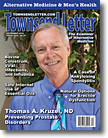Page 1, 2
Discussion
Her diagnosis of ankylosing spondylitis showed us that not only does she have an inflammatory arthritis affecting her spine, but also has chronic inflammation throughout her body. Patient was born premature which may have contributed to the formation of the immature immune system and possible dysbiosis. Her current medication, escitalopram (a selective serotonin reuptake inhibitor), can also be contributory to the dysregulation of the gut motility. Her current NSAID regiment may also be causing gastrointestinal mucosa inflammation contributing to a possible intestinal permeability. Patient's exposure to antibiotics and current symptoms of bloating and gas during the menstrual cycle suggests dysbiosis. Patient has been exposed to a high toxic burden with environmental factors, such as personal care items and polypharmacy at a young age, which may further dysregulate the immune system and the microbiome. Furthermore, the patient's diet of gluten and processed foods may exacerbate the inflammatory process. Additionally, being HLA-B27 positive is associated with certain autoimmune and immune-mediated diseases, suggesting a predisposition to ankylosing spondylitis.She also has been receiving steroid injections every couple of months from her conventional physician, which suppresses immunity and inflammation acutely; however these can increase susceptibility to infections, decrease productions of hormones, and increase risk of heart disease with chronic use, especially at a young age. Her high beta-glucuronidase in the stool is shown to predispose someone to autoimmunity.
Her blood lab results show MTHFR heterozygous gene mutation, functionally high homocysteine, and high globulin levels. We explained that this mutation deceases the active form of folate and can cause a buildup of homocysteine levels. Excess homocysteine can be harmful to our bodies, increasing inflammation, becoming more susceptible to certain cancers, increasing risk of cardiovascular disease, as well as affecting immunity.Her globulin levels can be high due to chronic inflammatory conditions, autoimmunity, or poor digestion and absorption, which is all indicated for this patient.
In my research, vitamin D plays a crucial role in autoimmune patients. Serum vitamin D deficiency is considered a risk factor for several chronic inflammatory or autoimmune conditions, including infectious diseases, type 1 diabetes, multiple sclerosis, and especially autoimmune rheumatic diseases, AS being one of these. Vitamin D deficiency seems to play a role in increasing autoantibody production by B cells, with seasonal vitamin D declines triggering flares in autoimmune rheumatic diseases. A severe serum vitamin D deficiency in genetically predisposed subjects can compromise immune responses by dysregulating dendritic cells and T and B cell functions. Optimal levels of vitamin D regulates both innate and adaptive immunity, allowing our immunity to decrease antigen presentation. Furthermore, serum vitamin D deficiency involves decreased immunity and increased inflammation in patients with rheumatic disease. This study noted that with vitamin D supplementation, there was major improvement with inflammation symptoms and suppressed immunity (Cutolo, 2014).
Studies have shown that vitamin D has immunologic activity. This fat-soluble vitamin has immunosuppressant effects in patients with autoimmunity. Therefore, this justifies why increased vitamin D intake is associated with a lower risk of autoimmune disease (Natural Medicines Databases, 2017).
In a meta-analysis, results suggest that vitamin D plays a protective role in AS. This study concluded that higher levels of serum vitamin D are associated with a decreased risk of AS. Inadequate vitamin D levels can cause imbalances in bone density and dysregulation of calcium resorption, which makes sense when you look at the physiology, that osteoporosis is a complication of AS. This also indicates that parathyroid hormone levels are linked, with high levels of PTH increasing activity of osteoclasts and serum calcium levels. In this study, it showed that PTH levels in AS patients are lower than the healthy controls, therefore warranting more studies between the correlation of PTH and vitamin D (Guoqi, 2015).
One study compared patients with AS versus healthy controls, concluding that vitamin D levels were significantly higher in the healthy control group (P < 0.01) and patients with AS have lower vitamin D levels. Another stimulating topic discussed how tumor necrosis factor alpha plays a role in chronic inflammation and inhibits the binding of vitamin D receptors. There is some discussion that systemic inflammation can lower vitamin D serum levels. Vitamin D can inhibit the expression of TNF-alpha, concluding that being deficient in vitamin D can cause the cascade of inflammation (Pokhai, 2014).
Another study showed that chronic vitamin D deficiency can result in a permanently altered intestinal environment that no longer favors the healthy bacteria in our gut. Many articles link vitamin D to the normal function of the immune system. In this scientific article, it stated that sustained deficiency of both vitamin D as well as pantothenic acid (B5), since it is needed to produce cortisol, can result in an abnormal pro-inflammatory state (Gominak, 2016).
Not only does vitamin D play an important role in ankylosing spondylitis, it plays an important role in all autoimmune diseases, such as Hashimoto's thyroiditis, systemic lupus erythematosus, rheumatoid arthritis, type 1 diabetes, and irritable bowel disease. Studies have shown that low vitamin D levels contribute to the development of autoimmune thyroid diseases. Furthermore, this article shows that vitamin D reduces levels of thyroid antibodies and suppresses autoimmune reaction. In this study, by doing a vitamin D replacement therapy, thyroid antibody titers decreased (Yasin, 2016). These studies on adequate vitamin D levels and decreased risk of autoimmunity seems to be promising for autoimmune conditions.
There is much research regarding serum vitamin D deficiency and its role in autoimmunity. Further studies are warranted to investigate the link between vitamin D levels and disease activity in AS patients. There is much research with preventing AS, however further research is indicated to understand how to decrease pain and symptoms when being diagnosed with AS. Future research should make an effort towards well-designed larger experimental groups as opposed to smaller sample sizes. Ultimately, research about the association of vitamin D receptor defects and AS susceptibility is warranted.
 Conclusion Conclusion
The use of vitamin D supplementation is vital for its role in autoimmunity, showing effectiveness in decreasing the risk of developing an autoimmune condition, such as ankylosing spondylitis. Vitamin D is shown to play a protective role in AS, signifying that without vitamin D, there can be permanent alterations of intestinal microbiota, causing inflammation. These results are favorable in treating this rare autoimmune condition, however more studies are warranted. We must note that the patient was on other medications and supplements. Future plan is to continue monitoring and increasing her quality of life and social abilities by keeping inflammation and pain under control, reintroducing foods that had been limited, and retesting labs to make sure we have stabilized her deficiencies and eradicating infections.
Page 1, 2
References
"About Spondylitis." Spondylitis Association of America, SSA, www.spondylitis.org/Ankylosing-Spondylitis/Diagnosis.
Agmon-Levin N, et al. Vitamin D in systemic and organ-specific autoimmune diseases. Clin Rev Allergy Immunol. October 2013.
Costello ME, et al. Brief Report: Intestinal Dysbiosis in Ankylosing Spondylitis. Arthritis Rheumatol. 2015;67(3):686-691.
Cutolo, M, et al. Vitamin D, Steroid Hormones, and Autoimmunity. New York Academy of Sciences. 16 Apr. 2014.
Dankers W, et al. Vitamin D in Autoimmunity: Molecular Mechanisms and Therapeutic Potential. Frontier Immunol. January 2017.
Gominak SC. Vitamin D Deficiency Changes the Intestinal Microbiome Reducing B Vitamin Production in the Gut. The Resulting Lack of Pantothenic Acid Adversely Affects the Immune System, Producing a "pro-Inflammatory" State Associated with Atherosclerosis and Autoimmunity. Clinical Key. 1 Sept. 2016.
Guoqi CG. Vitamin D in Ankylosing Spondylitis: Review and Meta-Analysis. Science Direct. Jan. 2015.
Pokhai GG, et al. Vitamin D Levels in Ankylosing Spondylitis: Does Deficiency Correspond to Disease Activity? Rev Bras Rheumatol. 2014; 54 (4): 330–334.
Vitamin D Monograph. Natural Medicines. 20 May 2017, naturalmedicinestherapeuticresearch-com.buproxy.bastyr.edu/databases/food-herbs supplements/mechanismofaction.
Yasin S, et al. Effects of Vitamin D treatment on thyroid autoimmunity. J Res Med Sci. June 2016.
Yu D. Assessment and Treatment of Ankylosing Spondylitis in Adults, UpToDate, July 2017.
 Alexandra Carlton is a naturopathic doctor and medical resident at the Susan Samueli Center for Integrative Medicine, University of California- Irvine. She received her Doctorate in Naturopathic Medicine from Bastyr University, California, and her bachelor of science at the University of Southern California in human physiology. Her passions include autoimmune diseases, mental health, women's health, and pediatrics. She is a conduit for healing by educating and inspiring optimal health through highly individualized and dedicated patient care. She enjoys hiking, dancing, cooking, is a travel enthusiast, and sports fanatic. Alexandra Carlton is a naturopathic doctor and medical resident at the Susan Samueli Center for Integrative Medicine, University of California- Irvine. She received her Doctorate in Naturopathic Medicine from Bastyr University, California, and her bachelor of science at the University of Southern California in human physiology. Her passions include autoimmune diseases, mental health, women's health, and pediatrics. She is a conduit for healing by educating and inspiring optimal health through highly individualized and dedicated patient care. She enjoys hiking, dancing, cooking, is a travel enthusiast, and sports fanatic.
|
![]()
![]()
![]()
![]()







 Alexandra Carlton is a naturopathic doctor and medical resident at the Susan Samueli Center for Integrative Medicine, University of California- Irvine. She received her Doctorate in Naturopathic Medicine from Bastyr University, California, and her bachelor of science at the University of Southern California in human physiology. Her passions include autoimmune diseases, mental health, women's health, and pediatrics. She is a conduit for healing by educating and inspiring optimal health through highly individualized and dedicated patient care. She enjoys hiking, dancing, cooking, is a travel enthusiast, and sports fanatic.
Alexandra Carlton is a naturopathic doctor and medical resident at the Susan Samueli Center for Integrative Medicine, University of California- Irvine. She received her Doctorate in Naturopathic Medicine from Bastyr University, California, and her bachelor of science at the University of Southern California in human physiology. Her passions include autoimmune diseases, mental health, women's health, and pediatrics. She is a conduit for healing by educating and inspiring optimal health through highly individualized and dedicated patient care. She enjoys hiking, dancing, cooking, is a travel enthusiast, and sports fanatic.